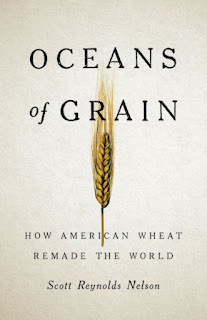 five books, including Steel Drivin’ Man, which received the Merle Curti Social History Award and the National Award for Arts Writing.
five books, including Steel Drivin’ Man, which received the Merle Curti Social History Award and the National Award for Arts Writing.
Nelson applied the “Page 99 Test” to his new book, Oceans of Grain: How American Wheat Remade the World, and reported the following:
Ninety-nine pages into Oceans of Grain gets you to an important cause for the American Civil War you probably never thought of: a conflict between the one percent in the North and the one percent in the South.Follow Scott Reynolds Nelson on Twitter.
Slavery caused the war but page 99 hits the most important issue for the merchant kings who dominated the Republican Party in the North. Would extreme inequality in the South spread northward? In the 1850s the most politically powerful people in New England and New York were not industrialists but merchants who made fortunes promoting and profiting from long-distance trade to the Midwest. Indiana wheat traded for New York plows, Ohio pork traded for Boston books, Mississippi cotton traded for, well, there’s the rub.
On page 99 we find that a scant ninety thousand slaveholders owned the vast majority of slaves in the South and most of its best land. Plantations had plenty to sell: cotton, tobacco, rice, and sometimes wheat. But plantations didn’t buy much of anything. Boxcars on Southern railroads carried staple crops to the coast and came back empty. Extreme inequality turned the South, as the Northern one percent saw it, into a wasteland. Enslaved people could not own land or buildings; the southern white ninety-nine percent were desperately, shockingly poor. Southern railroads in these consumer-thin regions failed repeatedly. In the 1850s when Southern slaveholders sought to force Kansas to become a slave state, the Northern one percent saw this as unnatural devastation, and grounds for war.
The rest of the book describes how the Northern one-percent’s dream for Kansas would be fulfilled after the Civil War. America would soon feed Europe with oceans of grain. After page 99 you’ll learn how a war between capitalism and slavery produced a futures market, interstate railroads connecting Chicago to New York, and a flow of European funds that made America’s robber barons among the richest people in the world. You’ll read how tens of millions of pounds of cheap American grain improved the welfare of European workers while it humbled America’s competitor – imperial Russia. By page 200 you’ll see how that cheap grain helped lay the groundwork for a world war and two revolutions.
But ninety-nine pages in we see where Northern and Southern elites would collide, hammer and tongs. You can keep the South, the Northern one percent told the Southern one percent, but you shall never have the plains of Kansas. That was enough to fight a war over.
The Page 69 Test: Steel Drivin' Man.
My Book, The Movie: Steel Drivin' Man.
--Marshal Zeringue



